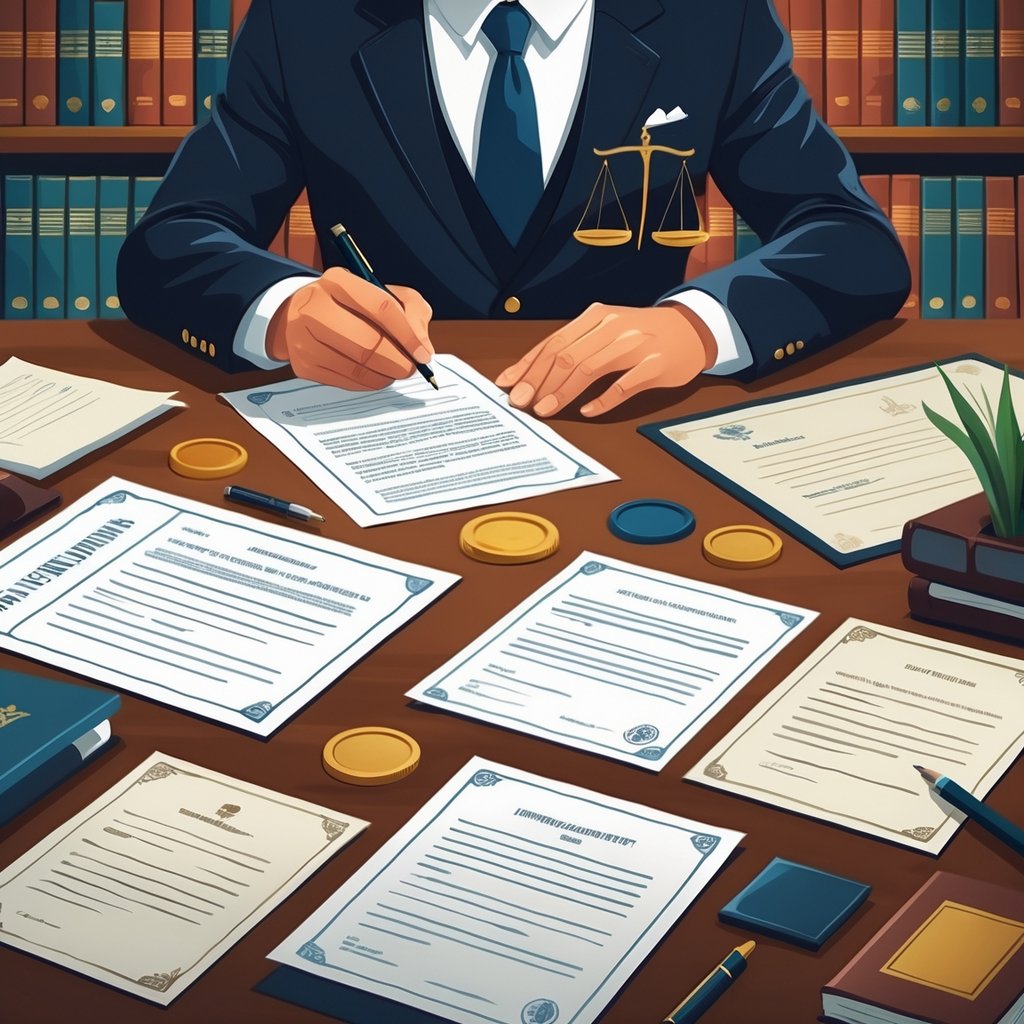Lots of folks ask if they can skip pricey lawyers and just write up a will at home. Yes, you can draft your own will and have it be legally valid, but you’ve got to follow your state’s specific rules. This do-it-yourself route saves cash, but it brings some real risks that could mess up your whole estate plan.

The secret to a legally valid homemade will is knowing your state’s requirements for signatures, witnesses, and how to execute the document. Even little mistakes in wording or witnessing can make your will useless, leaving your family tangled in intestacy laws.
Before you start, learn the difference between handwritten and typed wills, who needs to witness, and the traps that trip up homemade wills. Missing these details could mean your wishes get ignored, and your loved ones face headaches.
Key Takeaways
- Homemade wills can be legal if you meet your state’s requirements for signing and witnesses.
- Sloppy mistakes like bad witnessing or vague wording can wreck your whole will.
- Having a pro review your will helps dodge probate disasters.
Legal Requirements for a Homemade Will

DIY wills are legal if you meet your state’s rules for writing, signing, and having the right witnesses. Your will has to name beneficiaries, pick an executor, and follow exact signing steps.
Essential Elements for Validity
You need to write your will down. Courts won’t accept spoken wishes.
Make it clear you mean this as your last will. A simple line like “This is my Last Will and Testament” works.
Name the people who get your stuff. Use full names and say how you know them to avoid mix-ups.
List your assets with enough detail. Instead of “my house,” write the address or describe the item.
You’ll also want to:
- Appoint an executor for your estate
- Name a guardian if you’ve got minor kids
- Choose backups in case your first picks can’t do the job
Spell out what your executor needs to do, like paying bills and handing out your assets.
Role of the Testator
You need testamentary capacity to make a will. You should be at least 18 and in your right mind.
You should know:
- That you’re making a will
- What you own, in general
- Who your close family members are
Sign the will yourself, and don’t let anyone push you around. No one should force you to sign or change your will.
Most states want you to sign in front of witnesses. That way, they can confirm you did it willingly.
If you can’t sign, you can have someone else do it for you, but you must be there with the witnesses.
Witnesses and Their Responsibilities
Most states want two adult witnesses. They need to watch you sign.
Your witnesses shouldn’t be people who get anything from your will. This helps avoid fights about influence.
The usual way is you sign first, then they sign while you’re still there.
Witnesses need to:
- Be 18 or older
- Be mentally competent
- Not be named as beneficiaries
- Be present while you sign
Some states let beneficiaries be witnesses but may limit what they inherit.
You might want to get your will notarized with a self-proving affidavit. This makes things easier in probate.
Recognized Types of Homemade Wills

Different states accept different kinds of homemade wills. Handwritten ones are pretty common, but it all comes down to whether you followed your state’s rules.
Handwritten Wills Explained
A handwritten will is exactly what it sounds like—you write it out yourself, no computer needed. It still needs to meet your state’s basic legal rules.
Most states want these things in a handwritten will:
- Your signature at the end
- Two witnesses who see you sign and then sign too
- Clear ID of you as the person making the will
- Date you wrote it
Handwritten wills can be valid if you do them right. But handwriting can cause trouble that typed wills avoid.
If your handwriting’s messy, courts might not be able to read it. Relatives might argue over what you wrote. That can mean court fights nobody wants.
Don’t forget: You need to be of sound mind and usually at least 18.
Holographic Wills and Their Acceptance
Holographic wills are handwritten and don’t need witnesses in some states. You must write the whole thing yourself.
Only about half the states accept holographic wills. The rest want witnesses.
States that usually accept holographic wills:
- Texas
- California
- Arizona
- Nevada
- North Carolina
States that usually want witnesses:
- Florida
- New York
- Massachusetts
- Connecticut
You have to handwrite the whole document for a holographic will. Don’t use forms or let anyone else write parts of it.
Courts might compare your handwriting to other samples if your will gets challenged.
State Laws and Their Impact on Homemade Wills

State laws are all over the place when it comes to homemade wills. One state’s rules might not work in another.
Variations in Witness Requirements
Most states ask for two witnesses, but the details can get weird. Usually, witnesses can’t be people who benefit from your will.
Some places want both witnesses there at once. Others let them sign at different times as long as they acknowledge your signature.
Things that change state to state:
- How old witnesses must be (usually 18)
- Mental competency
- Whether witnesses can inherit
- If everyone needs to be in the same room
Generic will templates often miss these details, which can ruin your will in court.
States That Allow Holographic Wills
About half the states accept holographic wills. These are fully handwritten and sometimes don’t need witnesses.
States that typically allow holographic wills:
- Texas
- California
- Arizona
- Nevada
- North Carolina
Some states skip witnesses for holographic wills, but these get challenged in court more often.
Handwriting gets picked apart in court if anyone doubts you wrote it.
Even among states that allow them, rules can differ. Some want the whole thing in your handwriting, others care only about certain sections.
Potential Pitfalls and Challenges of Homemade Wills

Homemade wills can go sideways fast if you miss a requirement or use unclear language. Fixing mistakes in court can cost more than hiring a lawyer in the first place.
Common Mistakes That Can Invalidate a Will
Improper witnessing trips up a lot of DIY wills. Most states want two non-beneficiary witnesses.
Your witnesses have to see you sign. They need to sign right then too.
Vague descriptions of assets cause problems. If you write “my house” but have more than one, that’s not clear enough.
List addresses and account numbers. If you just say “my belongings,” expect arguments.
Missing signatures can ruin your will. Some states want notarization, some don’t.
Every state has its own rules. Don’t assume what works in one will work in another.
Old wills you forget to revoke can compete with your new one. Courts might have to sort out which one counts.
Tear up old wills when you make a new one. Write in the new will that you’re canceling all previous ones.
Consequences of an Invalid Will
If probate court rejects your will, your estate goes intestate. State law then decides who gets your stuff.
Usually, your spouse and kids inherit everything. People you care about who aren’t family might get left out.
Probate drags on longer when your will’s invalid. Your heirs could wait months or even years.
Court fights over your will drain your estate. Legal bills can eat thousands meant for your family.
Family arguments get worse when your wishes aren’t clear. Relatives might fight over what you really wanted.
Your loved ones go through more stress than they should. Clear, legal paperwork helps everyone move on.
Probate Process for Homemade Wills

The probate court treats your homemade will like any lawyer-made will if it checks all the boxes. Still, DIY wills usually get more questions and challenges in court.
Filing the Will With the Court
Your executor files your homemade will with probate court in your county. The court checks if you followed your state’s rules.
The court looks for:
- A written will
- Your own signature
- Two witnesses who signed in front of you (in most states)
- Proof you were of sound mind
A self-proving affidavit speeds up probate. This notarized form shows signatures are real.
Without it, the court might need to track down your witnesses. If witnesses have moved or passed away, things get messy.
The executor also lists your assets for the court—bank accounts, property, investments, and personal items.
Disputes and Will Contests
Homemade wills run a much higher risk of getting challenged by heirs or beneficiaries. Common disputes pop up over your mental capacity or claims that someone pressured you.
Frequent contest reasons:
- Unclear or confusing language
- Missing signatures or witnesses
- Doubts about your mental state at signing
- Allegations of pressure to change your will
Family members sometimes argue that vague language in homemade wills leads to expensive court fights. For instance, writing “my jewelry goes to my daughter” gets messy if you have more than one.
Heirs who feel left out or slighted tend to contest DIY wills more often than lawyer-drafted ones. They might say the will doesn’t really show your true wishes.
Will contests drag on for months, even years. While the fight goes on, your estate assets stay frozen.
Legal fees can chew up a big chunk of what your beneficiaries eventually get. If the court finds serious legal mistakes, it could toss out your entire will.
Your estate then gets divided under state intestacy laws, not your wishes.
Role of Legal Professionals and Estate Planning

Legal professionals offer essential guidance for estate planning and figuring out if your homemade will checks all the boxes in your state. Estate taxes and tricky family situations often need a pro’s touch to avoid expensive errors.
When to Consult a Legal Professional
You should reach out to an estate planning attorney if your situation involves complex assets or complicated family stuff. Homemade wills sometimes work for simple estates, but plenty of people really need professional help.
Complex Family Situations:
- Blended families with kids from previous marriages
- Minor children who need a guardian
- Family members with special needs
Significant Assets and Estate Taxes:
If you own valuable property or a business, or you might owe estate taxes, your plan needs a pro’s review. Legal professionals make sure you follow state rules and cut down on dispute risks.
State Law Requirements:
Every state has its own rules for valid wills. Attorneys know the witnessing, signature, and notarization rules for your state.
You need legal help if your will covers charity, trusts, or assets outside the US.
Homemade Wills Versus Professionally Drafted Wills
DIY wills can work for basic situations, but they come with risks that pros know how to avoid. Saving money upfront can backfire if legal problems show up later.
Homemade Will Advantages:
- Lower upfront cost
- Privacy while you write it
- Convenience of doing it at home
Professional Will Benefits:
- Satisfies all state legal requirements
- Clear language to avoid fights
- Deals with tricky tax issues
- Backup plans for surprises
Professional legal help gives your estate plan a better shot at working as you want. Attorneys spot problems before they turn into court drama.
Common DIY Mistakes:
- Leaving out required witnesses
- Vague descriptions of assets
- Not including digital assets
- Messing up signature procedures
Your estate plan shapes your family’s financial future. Getting a professional’s advice can protect you from mistakes that could wipe out your entire will.
Frequently Asked Questions

Understanding the legal requirements for a valid homemade will means knowing your state’s laws, witness rules, and what paperwork you need. These common questions cover the basics you need so your DIY will stands up in court.
What are the legal requirements for a will to be valid in California?
In California, you need to be at least 18 and of sound mind to make a valid will. The will has to be in writing and signed by you.
Two witnesses must watch you sign and then sign the will themselves. It’s best if your witnesses aren’t beneficiaries, to avoid trouble.
California also allows handwritten wills, called holographic wills, which don’t need witnesses. You have to write the entire thing in your own handwriting and sign it.
Is notarization required for a homemade will to be legally binding?
California doesn’t require notarization for a will to be valid. The signatures of you and two witnesses usually do the job.
You can make a self-proving will if you get it notarized along with witness signatures. That makes probate easier since witnesses don’t have to show up in court.
A notarized will might give you a little extra legal comfort, but it’s not required. Plenty of people make valid DIY wills without notarization.
How can one write a simple will without the assistance of an attorney?
Start by listing everything you own: real estate, bank accounts, investments, and personal stuff. Decide who gets each item after you pass.
Pick an executor to handle your estate and carry out your wishes. If you have young kids, name a guardian for them.
Write your will in plain, simple language. Use your full name, the date, and a clear statement that this is your last will and testament.
Sign the will in front of two witnesses who aren’t beneficiaries. Have both of them sign it too.
What are the implications of using a template for creating a will in California?
Templates can help you organize your thoughts and make sure you include the basics. Most templates have the right legal language and format.
Still, a generic template might miss details that matter for your situation or California’s laws. You could leave out important stuff.
If you use a template without understanding California’s rules, you might make mistakes that ruin your will. The legal details in wills can get tricky if you don’t know what you’re doing.
Can a will written at home be considered valid if all legal criteria are met?
Yes, a homemade will can be totally valid in California if you follow the legal requirements. You have the right to write your own will without hiring a lawyer.
Just make sure you follow California’s rules for witness signatures, formatting, and clear language. You also need to be of sound mind when you sign.
Most states let you draft your own will without a lawyer. California accepts both typed and handwritten wills if you do them right.
What steps should be taken to ensure a do-it-yourself will is enforceable in court?
Start by looking up California’s will requirements. You’ll want to know the rules for witnesses, signing, and the right format.
Use language that’s straightforward when naming your assets and beneficiaries. If you get too vague, people might argue about what you meant.
Keep your finished will somewhere safe. Let your executor know exactly where to find it.
You might want to give a copy to a trusted family member or your attorney, just in case.
Take another look at your will every so often, especially after big changes like marriage, divorce, or having kids. Sign any updates with the same care as you did the first time.











